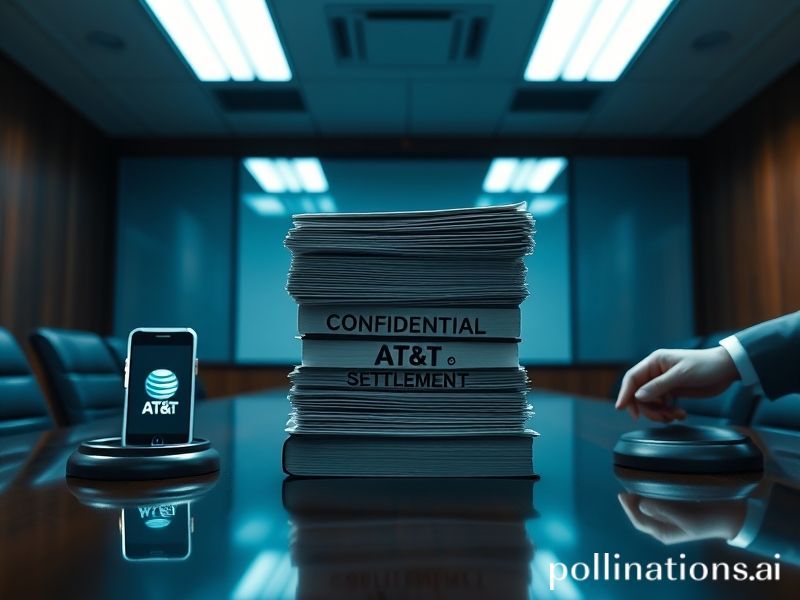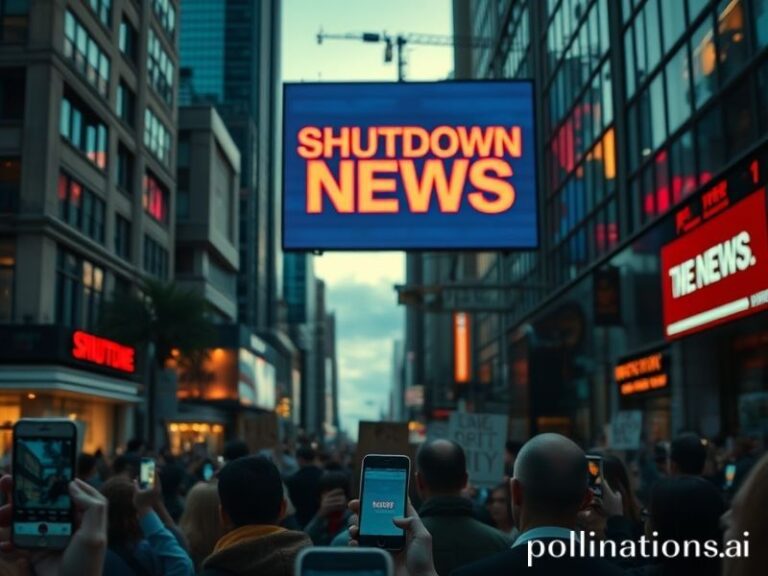AT&T’s $13M Privacy Fine: A Global Masterclass in How to Monetize Every Step You Take
AT&T Quietly Agrees to Pay $13 Million, Reminds Planet That American Phone Bills Still Fund Espionage Lite
By the time the sun rose over Singapore, the fine had already been wired. Somewhere in Dallas, a compliance officer breathed into a paper bag while an intern updated the “Bribery & Wiretap Slush Fund” spreadsheet. AT&T—America’s most beloved Death Star of roaming charges—has agreed to cough up $13 million to settle federal charges that it sold customer location data to bounty hunters, bail-bond firms, and that one guy in a Tampa strip-mall who swore he was “sort of a cop.” The fine, roughly equal to 0.012% of last quarter’s revenue, will be paid in the time it takes the company to send you three “your bill is ready” text messages.
The global angle? Oh, buckle up. While European regulators were busy fining Meta enough to buy Luxembourg, the U.S. Federal Communications Commission (FCC) settled for an amount that wouldn’t cover Lionel Messi’s Tuesday lunch. The message to the rest of the world is unmistakable: if you’re going to monetize human movement data, do it from Delaware and bring lobbyists. The FCC’s order reads like a disappointed parent who still hands over the car keys: “AT&T must implement a compliance plan.” Translation: hire three more lawyers and call it a day.
From Lagos to Lahore, the reaction ranged from weary shrugs to active envy. Nigerian fintech founders WhatsApp-voiced each other: “Wait, you can get caught selling private data and only pay a rounding error?” Meanwhile, Chinese telecom executives—fresh from the latest state-mandated “Ethics in Surveillance” workshop—are furiously scribbling notes on how to export the American model of apology-as-a-service. In Brussels, a privacy commissioner slammed down her cortado and muttered something unprintable in Flemish. Even the North Koreans, who usually limit their commentary to ballistic missile metaphors, released a statement praising the “creative accounting of capitalist imperialism.”
The settlement technically ends a saga that began when Motherboard revealed in 2018 that anyone with $300 and a PayPal account could track any American phone in near-real time. AT&T, T-Mobile, and Sprint had all funneled location feeds through third-party “location aggregators,” a euphemism that sounds like a dating app for stalkers. Sprint paid $12 million last year; T-Mobile is still negotiating, presumably while its CEO sky-dives into another magenta publicity stunt. AT&T’s contribution—$13 million—won’t even cover the executive bonus pool euphemistically labeled “retention incentives.”
But the real punch line is planetary scale. Every major carrier on earth—from Telstra in Australia to Jio in India—quietly runs the same data bazaar. The difference is jurisdiction. The EU’s GDPR would have triggered fines up to 4% of global revenue, enough to make board members consider public transit. Brazil’s LGPD carries penalties that can erase an entire fiscal year of caipirinha ads. Only in the land of the free does the regulator accept an amount that shareholders classify as “a mild sneeze.”
Still, AT&T insists it has Learned Important Lessons™. The company promises “robust privacy controls,” a phrase that ranks alongside “airline customer service” on the credibility index. Customers, meanwhile, will receive no direct compensation—unless you count the usual text alert reminding you that you’ve burned through 90% of your data plan watching cat videos at 2 a.m. The FCC did mandate that AT&T notify affected users, which means sometime in 2025 you’ll get an email that lands in your spam folder between “Nigerian Prince Update” and “Hot Singles in Your Area.”
So what does it all mean for the species? First, that surveillance capitalism is now a standardized export: American innovation at its finest. Second, that fines are simply the subscription fee for behaving badly—cheaper than Netflix, slightly more expensive than Disney+. And third, that the next time you wander the globe with your phone pinging cell towers from Reykjavík to Riyadh, remember: your coordinates are worth about $4.50 on the open market, but the convenience of not unfolding a paper map is priceless.
Humanity, it seems, will happily trade privacy for the dopamine hit of seeing a rideshare icon inch closer—even if that icon is also inching closer for the tax collector, the ex-spouse, and the occasional Bond villain. AT&T merely collected the cover charge. The rest of us keep dancing, location services on, hearts in airplane mode.







